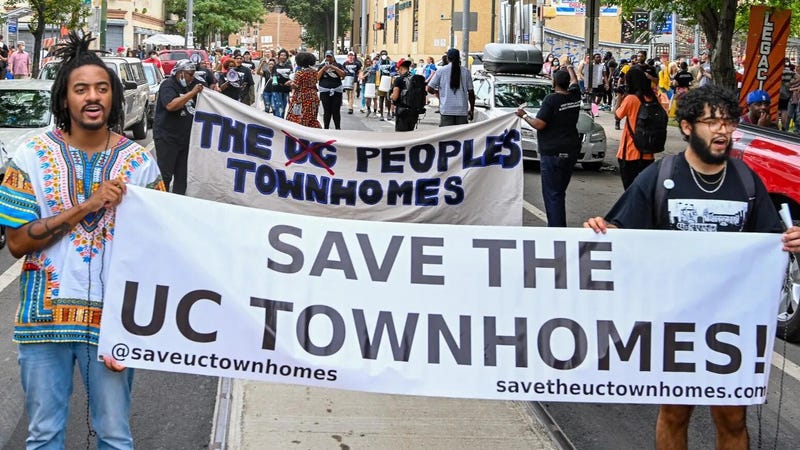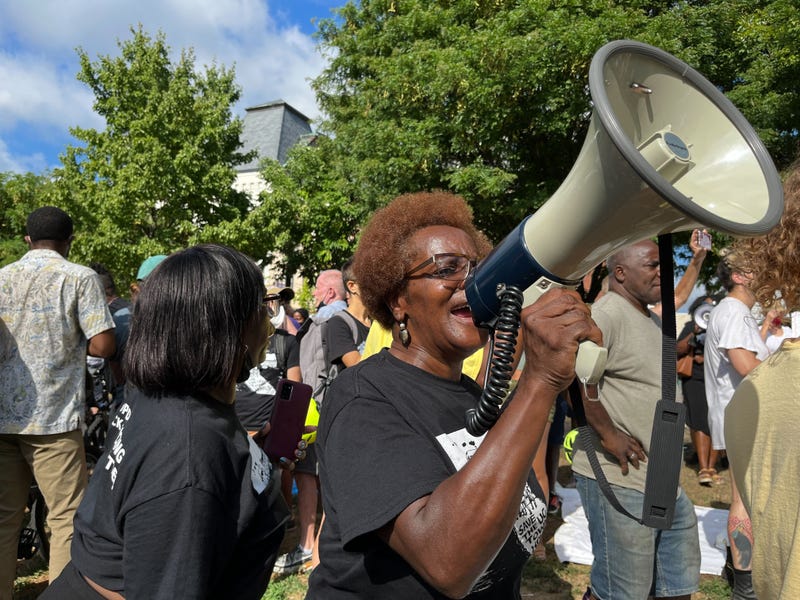
PHILADELPHIA (KYW Newsradio) — Residents displaced from a West Philadelphia affordable housing complex will share in a multimillion-dollar settlement following an agreement between the city and the owners of the property. The settlement will include construction of more affordable housing units and a fund for displaced tenants.
The battle over University City Townhomes, at 40th and Market streets, began two years ago. Residents were forced out of their homes after the subsidy at UC Townhomes expired, and property owners I.B.I.D. Associates announced their intention to sell the property.
City Council then passed the Affordable Housing Preservation Overlay District bill introduced by Councilmember Jamie Gauthier to block the sale and demolition of the property. The owners sued Gauthier and the city. Last summer, UC Townhomes residents protested their removal.

Now, after a long legal battle, I.B.I.D. Associates and the city have reached a $3.5 million settlement, including the transfer of a parcel of land to the city to build 70 new affordable housing units and money to displaced residents.
Gauthier says the city welcomes growth, but not in a way that disregards people.
“Just because someone doesn't have a lot of income doesn't mean that they shouldn't be considered, and doesn't mean that they don't have any rights,” she said.
The city has engaged United Way of Greater Philadelphia and Southern New Jersey to distribute the funds to the former tenants of 70 units at UC Townhomes to mitigate the costs of their relocation.
“Even though true equity means no one gets displaced from their home, this settlement is a historic win. No one has ever fought this hard, or won as much, for the residents of an expired affordable housing site, and I am excited by the creation of 70 permanently affordable homes in the heart of a rapidly gentrifying area of opportunity,” said Gathier.
“I ran for City Council because I believe equitable development and working class residents are worth fighting for. This settlement proves what we can accomplish when we stand up for the rights of low-income neighbors and reminds us that the city must take a more proactive and bold approach to preserving affordable housing.”
But the UC Townhomes Resident Council isn’t celebrating just yet.
“It's facing in the right direction,” said resident member Sheldon Davids. “I'm not even sure how much of a step it is.”
The Resident Council says the agreement falls short of addressing the needs of the families and seniors who were forced to relocate. And they want a written commitment that guarantees a right to return with a housing subsidy for current and former residents.
“The only way that we can take that as a given is if a commitment is made that will be a part of the plan,” Davids said.
In a statement, the members said, in part, “The deal sets aside just over 19% of the current site for affordable housing and does not specifically address residents’ ‘right to return’ or direct involvement in the future development of the property. Additionally, the settlement’s current “affordability” terms, which target tenants with incomes at 60% to 80% of the area median income (AMI), do not meet the affordability needs of seniors and families currently living at and around the site. Residents have continued to demand that the site prioritizes housing for families on fixed incomes at 30% AMI or lower.”
Davids says, also, much of the negotiations were conducted without the knowledge or input of residents. And written commitments are needed for all agreements.
There will be more discussions — regarding the agreement and future meetings with the city — on Friday.
Also as part of the deal, I.B.I.D. will transfer a 23,595 square foot parcel of the property to the city’s inventory for development of 70 permanently affordable units plus community green space. And the city will amend the Affordable Housing Preservation Overlay District to exclude the I.B.I.D. property.
The bigger picture here, and even more concerning, is that Philadelphia has thousands of affordable units with upcoming subsidy expiration dates.
Gautier says she is well aware.
“We have a plan for the rest of the housing units that are at risk. Certainly, University City Townhomes was the most high-profile, very visible example of units that were at risk because of an expiring subsidy and an owner wanting to cash out, but we literally have 1000s of these types of housing units,” said Gauthier.
“No. 1, attempt to keep these units in service as affordable housing for people. But No. 2, make sure that folks aren't just thrown out on the street. Our children, our families, deserve equity and deserves the city to stand up for them.”


